Letters home from Georgia
Winter 2006
Letter V, 3 APRIL 2006
dear friends!
This past week was spent in the west-Georgian province of Mingrelia, visiting the family of my close friend Shota, who is now a deputy in the Georgian parliament. Berucha and I were accompanied by Shota's niece Inga on the 5-hour drive from Tbilisi. The weather was fantastic, and indeed Nature provided one of the most spectular highlights of the trip, as you will discover further on.
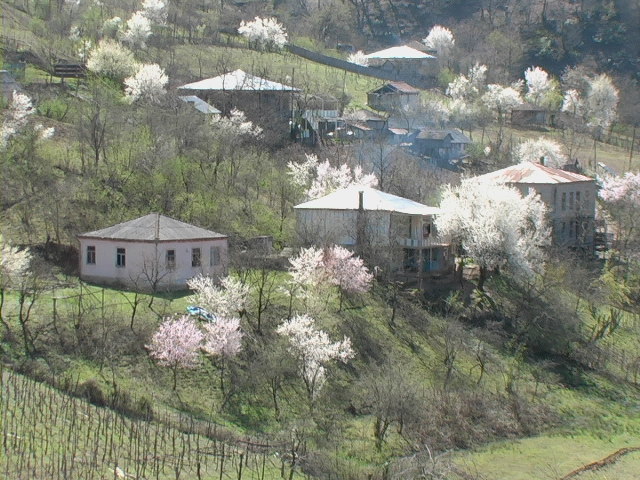
1. Although Georgia is smaller than the US state of the same name, its climate is surprisingly complex, with major differences between the eastern and western halves of the country (to say nothing of effects due to altitude). Tbilisi was overcast & chilly the morning we left. Two hours later, we emerged from the tunnel through the central mountain range into summer-like warmth. Set against the green of grass and fields are puffs of white and light pink created by the blossoming ch'erami and t'q'emali trees (local varieties of apricot and plum), which are especially abundant in this part of Georgia.
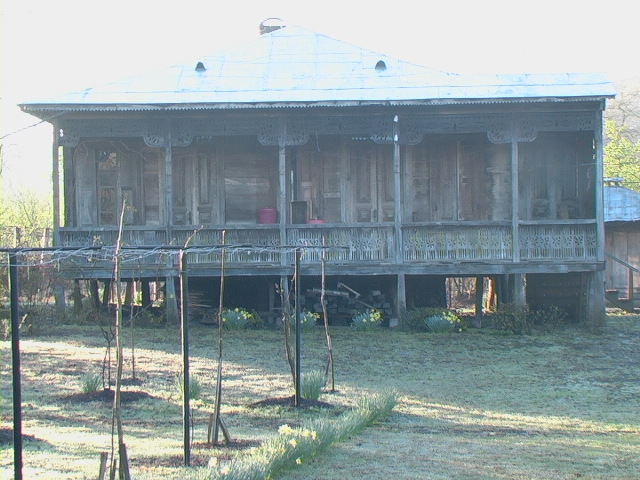
2. Because of the moist, warm climate, traditional Mingrelian houses were built on pillars 2-3 feet off the ground. This house, across the street from my hosts in the village Jgali, is about a century old.
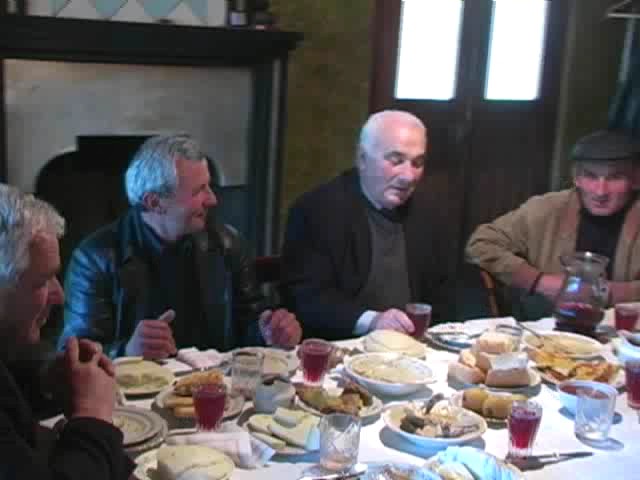
3. As you should have all guessed from previous installments in this series, major feasting happened during my stay in Mingrelia. Here are some of my hosts and their neighbors at table during the evening of my arrival. The guy holding the wine glass, by the way, who lives in the house shown above, is named Alexandre Beria, and yes he is distantly related to you-know-you.
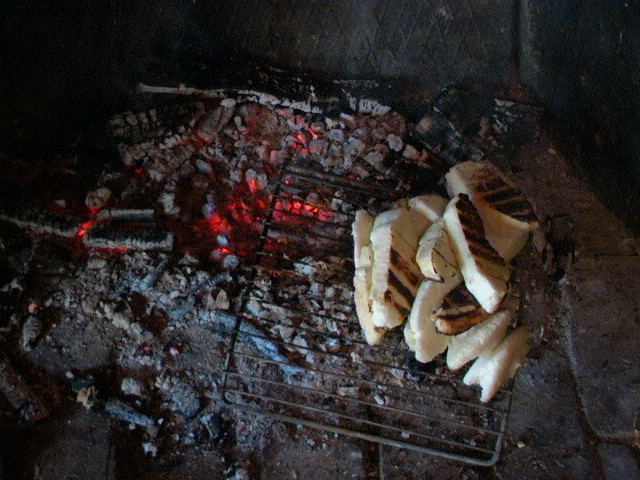
4. Each guest at table is served a heaping plate of ghomi (like polenta, made from corn meal), far more than even I can eat. The next morning, slices of congealed polenta grilled over hot embers are served at breakfast -- Absolutely delicious, especially with cheese grilled in the same way.
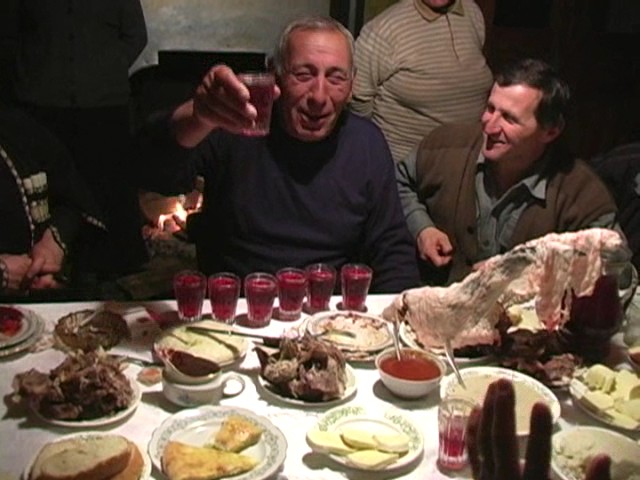
5. At the banquet on the second night, our toastmaster was a champion drinker named Chochi, who is reputed to have drunk wine by the pail-full (literally) without suffering the effects. In the wee hours of the morning, after each of us had done a litre or so, Chochi had seven glasses filled with local red wine (from a variety of grape called "Odessa", and actually quite tasty if you're allowed to drink it slowly) -- one for each person he hadn't yet toasted.
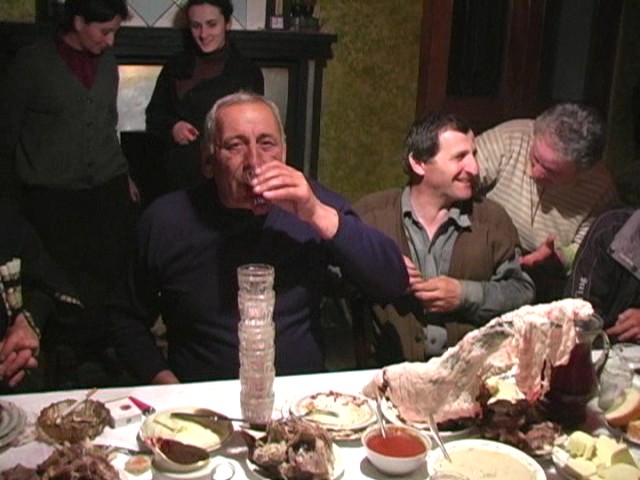
6. (warning: do not attempt to do this at home). One by one Chochi downed all seven glasses, stacking them up as he went down the row. In case any of you are wondering, that weird-looking lumpy thing on the table to Chochi's left is a goat's head draped in fat. Goat meat -- some of which is piled on plates -- is especially prized in Mingrelia, since goats are believed to eat only the best-quality leaves & grass (because they're smarter than sheep, I suppose)
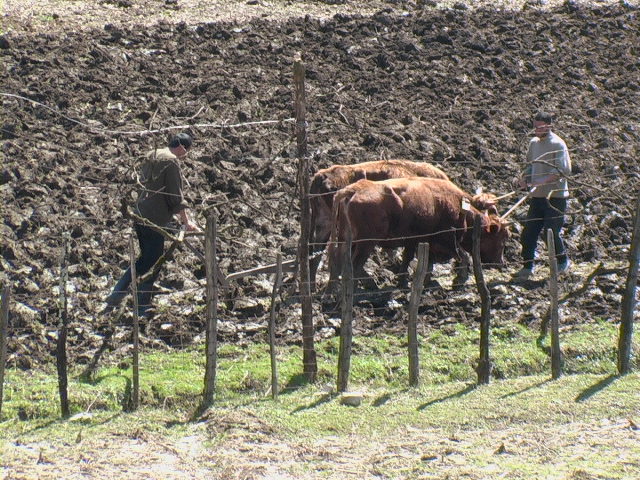
7. On the 29th, we visited the village of Medani, to visit with my friend Inga's 84-year-old grandfather. As the neighbors ploughed their field the old fashioned way -- tough work in the clayey local soil -- we sat in the shade, had yet more food & wine, and waited for a rare and wonderful event to occur.
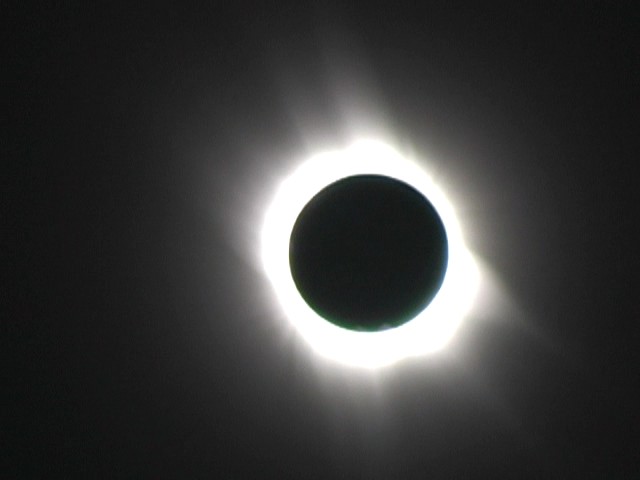
8. Just before 3pm local time, the ambient sunlight became noticeably fainter and the temperature started to drop, even though there was not a cloud to be seen. Roosters began crowing, chirping birds gathered in the trees, and cattle grazing nearby turned back toward the village. At 15h12 the sky rapidly darkened and stars became visible. The driver of a car passing through Medani turned on his headlights. Seconds later we beheld a total eclipse of the sun, lasting slightly over three minutes. I had never witnessed one of these before, and no astronomy textbook can adequately prepare you for the undiluted awe an eclipse inspires.
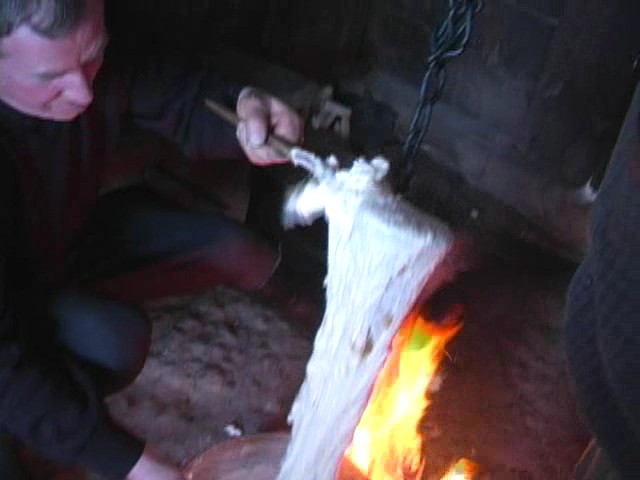
9. After the eclipse, almost anything will come across as an anticlimax, but you still have to eat after all. The following day we visited the camp of Inga's uncle T'ut'u K'varacxelia -- real name Sasha, but like everyone in Mingrelia, he has a nickname -- who has a herd of 120+ cattle and 25 horses. During the cold months he and 3 other shepherds camp in the flatlands near Lake P'aliast'om, close to the Black Sea coast. In mid-June T'ut'u rounds up his beasts for a weeklong trek to the summer alpine pastures in the mountains bordering Svaneti, about 100 km to the northeast, where they stay until the snows return at the end of September. Here is T'ut'u's friend Gigla making one of the shepherds' favorite dishes, called elardji. After making a batch of polenta, about a sixth of it is left in the pot. Crumbled fresh cheese is added to the hot polenta, and the mixture is stirred with a long flat wooden spoon until ideal consistency -- if the elardji can be stretched to 80 cm length, it's ready. The best part, though, is the crust (kerki) remaining in the pot.
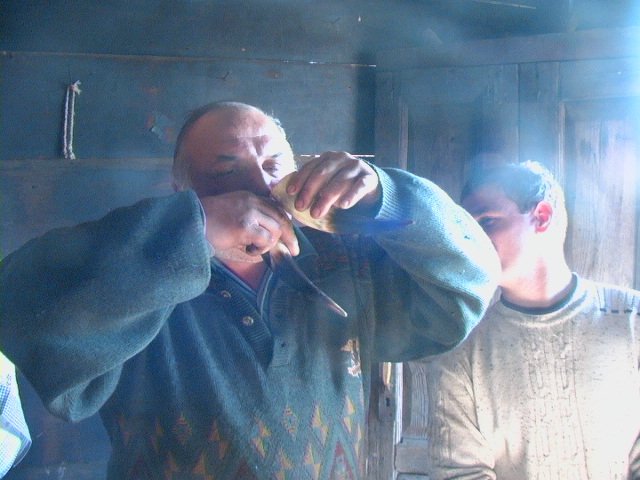
10. One more party trick to amaze your friends. Here is one of the shepherds showing how to drink from two horns at once. The secret is to pour wine from the upper horn into the lower while draining the lower horn. (Disclaimer: I take no responsibility for any spills, stains or other adverse consequences if any of you attempt to duplicate the two-horn trick. I would advise practicing with water before trying it with real wine).
My stay in Georgia ends on 29 April, and hopefully I will do a few more field trips before going back to Montreal. If so, more pictures will be coming your way. Otherwise, the next slideshow will take place in Montreal sometime in early May. I'll provide the horns if you are willing to supply the wine.
bye for now!
Kevin
BACK TO INDEX.